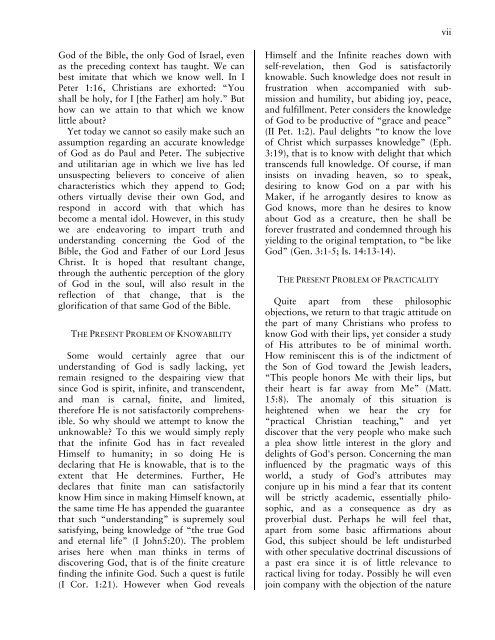that I should obey Him? - Future Israel Ministries
that I should obey Him? - Future Israel Ministries
that I should obey Him? - Future Israel Ministries
You also want an ePaper? Increase the reach of your titles
YUMPU automatically turns print PDFs into web optimized ePapers that Google loves.
God of the Bible, the only God of <strong>Israel</strong>, even<br />
as the preceding context has taught. We can<br />
best imitate <strong>that</strong> which we know well. In I<br />
Peter 1:16, Christians are exhorted: “You<br />
shall be holy, for I [the Father] am holy.” But<br />
how can we attain to <strong>that</strong> which we know<br />
little about?<br />
Yet today we cannot so easily make such an<br />
assumption regarding an accurate knowledge<br />
of God as do Paul and Peter. The subjective<br />
and utilitarian age in which we live has led<br />
unsuspecting believers to conceive of alien<br />
characteristics which they append to God;<br />
others virtually devise their own God, and<br />
respond in accord with <strong>that</strong> which has<br />
become a mental idol. However, in this study<br />
we are endeavoring to impart truth and<br />
understanding concerning the God of the<br />
Bible, the God and Father of our Lord Jesus<br />
Christ. It is hoped <strong>that</strong> resultant change,<br />
through the authentic perception of the glory<br />
of God in the soul, will also result in the<br />
reflection of <strong>that</strong> change, <strong>that</strong> is the<br />
glorification of <strong>that</strong> same God of the Bible.<br />
THE PRESENT PROBLEM OF KNOWABILITY<br />
Some would certainly agree <strong>that</strong> our<br />
understanding of God is sadly lacking, yet<br />
remain resigned to the despairing view <strong>that</strong><br />
since God is spirit, infinite, and transcendent,<br />
and man is carnal, finite, and limited,<br />
therefore He is not satisfactorily comprehensible.<br />
So why <strong>should</strong> we attempt to know the<br />
unknowable? To this we would simply reply<br />
<strong>that</strong> the infinite God has in fact revealed<br />
<strong>Him</strong>self to humanity; in so doing He is<br />
declaring <strong>that</strong> He is knowable, <strong>that</strong> is to the<br />
extent <strong>that</strong> He determines. Further, He<br />
declares <strong>that</strong> finite man can satisfactorily<br />
know <strong>Him</strong> since in making <strong>Him</strong>self known, at<br />
the same time He has appended the guarantee<br />
<strong>that</strong> such “understanding” is supremely soul<br />
satisfying, being knowledge of “the true God<br />
and eternal life” (I John5:20). The problem<br />
arises here when man thinks in terms of<br />
discovering God, <strong>that</strong> is of the finite creature<br />
finding the infinite God. Such a quest is futile<br />
(I Cor. 1:21). However when God reveals<br />
vii<br />
<strong>Him</strong>self and the Infinite reaches down with<br />
self-revelation, then God is satisfactorily<br />
knowable. Such knowledge does not result in<br />
frustration when accompanied with submission<br />
and humility, but abiding joy, peace,<br />
and fulfillment. Peter considers the knowledge<br />
of God to be productive of “grace and peace”<br />
(II Pet. 1:2). Paul delights “to know the love<br />
of Christ which surpasses knowledge” (Eph.<br />
3:19), <strong>that</strong> is to know with delight <strong>that</strong> which<br />
transcends full knowledge. Of course, if man<br />
insists on invading heaven, so to speak,<br />
desiring to know God on a par with his<br />
Maker, if he arrogantly desires to know as<br />
God knows, more than he desires to know<br />
about God as a creature, then he shall be<br />
forever frustrated and condemned through his<br />
yielding to the original temptation, to “be like<br />
God” (Gen. 3:1-5; Is. 14:13-14).<br />
THE PRESENT PROBLEM OF PRACTICALITY<br />
Quite apart from these philosophic<br />
objections, we return to <strong>that</strong> tragic attitude on<br />
the part of many Christians who profess to<br />
know God with their lips, yet consider a study<br />
of His attributes to be of minimal worth.<br />
How reminiscent this is of the indictment of<br />
the Son of God toward the Jewish leaders,<br />
“This people honors Me with their lips, but<br />
their heart is far away from Me” (Matt.<br />
15:8). The anomaly of this situation is<br />
heightened when we hear the cry for<br />
“practical Christian teaching,” and yet<br />
discover <strong>that</strong> the very people who make such<br />
a plea show little interest in the glory and<br />
delights of God's person. Concerning the man<br />
influenced by the pragmatic ways of this<br />
world, a study of God’s attributes may<br />
conjure up in his mind a fear <strong>that</strong> its content<br />
will be strictly academic, essentially philosophic,<br />
and as a consequence as dry as<br />
proverbial dust. Perhaps he will feel <strong>that</strong>,<br />
apart from some basic affirmations about<br />
God, this subject <strong>should</strong> be left undisturbed<br />
with other speculative doctrinal discussions of<br />
a past era since it is of little relevance to<br />
ractical living for today. Possibly he will even<br />
join company with the objection of the nature


